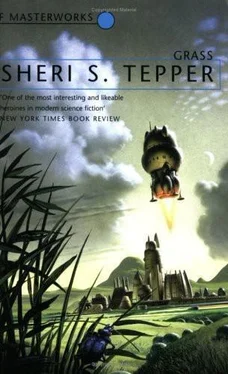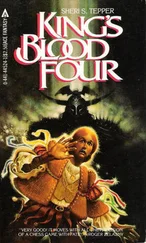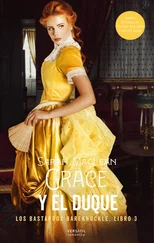Sheri Tepper - Grass
Здесь есть возможность читать онлайн «Sheri Tepper - Grass» весь текст электронной книги совершенно бесплатно (целиком полную версию без сокращений). В некоторых случаях можно слушать аудио, скачать через торрент в формате fb2 и присутствует краткое содержание. Город: London, Год выпуска: 2002, ISBN: 2002, Издательство: Gollancz, Жанр: Фантастика и фэнтези, на английском языке. Описание произведения, (предисловие) а так же отзывы посетителей доступны на портале библиотеки ЛибКат.
- Название:Grass
- Автор:
- Издательство:Gollancz
- Жанр:
- Год:2002
- Город:London
- ISBN:9781857987980
- Рейтинг книги:4 / 5. Голосов: 1
-
Избранное:Добавить в избранное
- Отзывы:
-
Ваша оценка:
- 80
- 1
- 2
- 3
- 4
- 5
Grass: краткое содержание, описание и аннотация
Предлагаем к чтению аннотацию, описание, краткое содержание или предисловие (зависит от того, что написал сам автор книги «Grass»). Если вы не нашли необходимую информацию о книге — напишите в комментариях, мы постараемся отыскать её.
Grass — читать онлайн бесплатно полную книгу (весь текст) целиком
Ниже представлен текст книги, разбитый по страницам. Система сохранения места последней прочитанной страницы, позволяет с удобством читать онлайн бесплатно книгу «Grass», без необходимости каждый раз заново искать на чём Вы остановились. Поставьте закладку, и сможете в любой момент перейти на страницу, на которой закончили чтение.
Интервал:
Закладка:
In this great hall they blinked their squinty eyes, deep-pocketed in indigo fur, and chirped to one another in flute tones as they plodded across the cavern, scraping the high places into the low with urgent flat-edged claws, stamping the loose dirt down with the hard pads on their industrious hind feet.
A Hippae came into the cavern, striding on great tripartite hooves across the smoothed floor, quartering the cave again and again, nodding approval with his monstrous head, the teeth showing slightly where the lips drew back in a half snarl, the razorlike neck barbs making a dissonant clash as the beast tossed its head and bellowed at the ceiling.
The migerers affected not to notice, perhaps really did not notice. Nothing changed in their behavior. They still darted about under the very hooves of the prancing monster, scraping, packing, filling their furry pockets, and darting away into the grasses to dispose of this evidence of industry. Only when they were finished, when the floor was as smooth as their instinctive skills could make it, did they desist and fall to grooming round bellies and small tough feet, combing whiskers with curved ivory claws, blinking in the half light of the entrance slits. Then a whistle, a plaint on the wind as from some bird calling in mild distress, and they were gone, away, vanished in the grasses as though they had never been. In the cavern behind them the Hippae continued its slow parade, bellowing now and again to make the cavern ring, alone in majesty surveying and approving the work which had been done.
A second monster called in response, entering the cavern to begin a quartering of its own. Then came a third and fourth, then many, prancing in intricate patterns upon the cavern floor, interweaving and paralleling, twos and fours and sixes becoming twelves and eighteens, the files of them turning and braiding in complicated design, hooves falling as precisely as artisans’ hammers into the tracks themselves had made.
Not far off, in Opal Hill village. Dulia Mechanic turned restlessly on her bed, half wakened by the subterranean thunder. “What, what’s that?” she murmured, still mostly asleep.
“The Hippae are dancing,” said her young husband Sebastian Mechanic, wide awake, for he had been listening to the rhythmic surge for an hour or more while she had breathed quietly beside him. “Dancing,” he reasserted, not sure whether he believed it or not. Besides, he had something else on his mind.
“How do you know? Everyone says that, but how do you know?” she whined, still not awake.
“Someone saw them, I suppose,” he said, wondering for the first time how that particular someone had seen what he claimed he had seen. Sebastian himself would rather face certain death than sneak around in the tall grasses, spying on Hippae. Without identifying the source, he murmured, “Someone, a long time ago,” and went back to thinking what he had been thinking of for a long time now, about those at Opal Hill.
Out in the night, in the cavern where all the thunder came from, the Hippae moved their anfractuous quadrille along to its culmination.
Suddenly, without any sense of climax, it was over. The Hippae left the cavern as they had entered it, by ones and twos, leaving a pattern intricate and detailed as a tapestry trampled deep into the floor behind them. To them who made it, it had meaning, a meaning otherwise expressible only by a long sequence of twitches of hide and particular blinks of eye. The ancient Hippae language of gesture and quiver and almost undetectable movement was useless for this particular purpose, but the Hippae know another language as well. In the other language, learned long ago from another race, this design stamped deep into their cavern floor was their way of writing — and thereby giving notice of — a certain inexorable word.
In the stables at Opal Hill, the horses were awake, listening as they had listened many nights, most nights, since they had come to Grass. Millefiori whickered to the stallion, Don Quixote, and he in turn to Irish Lass next to him, the whispering rattle running down the length of the stalls and then back again, like a roll-taking. “Here,” each seemed to say. “Still here. Nothing yet.”
But there was something. Something they had begun to be more than remotely aware of. One of those shadows one shies at, one of those bridges one will not walk over. A thing like that, full of menace, which the riders usually do not understand. Most of them. The woman, she understood. She always understood. If there was a thing like that, she never insisted. Never. And in return, each gave her total trust. When she rode them at the high fence, the fence one could not see over, with no knowledge at all of what might be beyond, each one trusted that she would bring them safely down on the other side. They knew it as trust. She would not betray them, not one of them.
Not that they thought in words. They did not have the words. It was more an understanding of the way things were. The rewards, the threats. That thing out there on the ridge that day. This noise, moving in the night, this noise that tried to crawl into ears, into heads, to take over everything. These were threats.
But there was something else abroad in the night, and that… that was something they could not identify as either a threat or a reward. It fought against the horrid noise; it kept the insinuating thoughts away. And yet, it came no closer, it offered no hay, it stroked no necks. It was simply there, like a breathing wall, a thing they did not understand at all.
So the whicker ran, left to right, then back again. “Here. Still here. All right. Still alive. Nothing…”
“Nothing yet.”
Jandra Jellico did as she had threatened and went over to Portside in her half-person to visit with Ducky Johns. She’d met Ducky before and quite liked her, despite the business she was in, which Jandra didn’t altogether approve of. Pleasure was pleasure, had been for ages, and people would seek it out. Some of the ways they sought it, though, in Jandra’s opinion, were not quite tasteful.
Still, she made nothing of that as she sat in Ducky Johns’ private parlor, sipping tea and staring at the girl who sat on the carpet, humming to herself. Itself. Whatever. When the girl got an itch, up came the skirt and the hand scratched, wherever the itch might be. No inhibitions at all, no more than a cat, licking itself where it needed it.
“My, my,” Jandra said. “You can’t keep her here, Ducky.”
“Well, and who wanted to?” Ducky sulked, waving her tiny hands in circles to express innocent annoyance. “It was Jelly, your own Jelly, made me bring her back here. She’s useless to me, dear. Can’t sell her. Who’d want her? Needs to be trained before she’s any use at all.”
“Does she potty?” Jandra wanted to know.
“Except for eating, that’s all she does, but potty she does. Like my wallo-pup, whines when she needs to go.”
“Have you tried—”
“Haven’t tried anything at all. No time. This business keeps me at it, day on day. No time for fooling with that!” The little hands waved again, then folded themselves into an obdurate lump buried deep in Ducky’s lap. “Tell me you’ll take her away, Jandra. Do say so. Anyone else, your Jelly would argue.”
“Oh, I’ll take her,” Jandra agreed. “Or send for her, rather. But it’s, the strangest thing. The very strangest thing. Where’d she come from?”
“Wouldn’t we like to know that, my dear? Wouldn’t we all?”
Jandra sent for the girl that afternoon. Thereafter she spent a good part of several days teaching the girl to keep her skirts down and to eat with her fingers instead of burying her face in the food and to go potty by herself without whining. When she’d done that much, she called Kinny Few on the tell-me and invited her over, and the two of them sipped tea and nibbled at Kinny’s seed cakes while they watched the girl playing with a ball on the floor.
Читать дальшеИнтервал:
Закладка:
Похожие книги на «Grass»
Представляем Вашему вниманию похожие книги на «Grass» списком для выбора. Мы отобрали схожую по названию и смыслу литературу в надежде предоставить читателям больше вариантов отыскать новые, интересные, ещё непрочитанные произведения.
Обсуждение, отзывы о книге «Grass» и просто собственные мнения читателей. Оставьте ваши комментарии, напишите, что Вы думаете о произведении, его смысле или главных героях. Укажите что конкретно понравилось, а что нет, и почему Вы так считаете.












